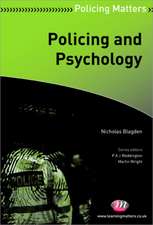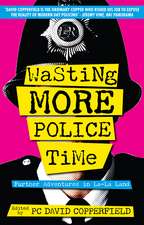Understanding Police Intelligence Work: Key Themes in Policing
Autor Adrian L. Jamesen Limba Engleză Paperback – 26 apr 2016
Procedural and moral shortcomings in both child abuse cases and the long-term deployment of undercover police officers have raised questions about the effectiveness and efficacy of intelligence work, and yet intelligence work plays an ever growing role in policing. Part of a new series on evidence-based policing, this book is the first to offer a comprehensive, fully up-to-date account of how police can—and do—use intelligence, assessing the threats and opportunities presented by new digital technology, like the widespread use of social media and the emergence of “big data,” and applying both a practical and an ethical lens to police intelligence activities.
| Toate formatele și edițiile | Preț | Express |
|---|---|---|
| Paperback (1) | 250.12 lei 3-5 săpt. | |
| Bristol University Press – 26 apr 2016 | 250.12 lei 3-5 săpt. | |
| Hardback (1) | 730.34 lei 6-8 săpt. | |
| Bristol University Press – 26 apr 2016 | 730.34 lei 6-8 săpt. |
Preț: 250.12 lei
Nou
Puncte Express: 375
Preț estimativ în valută:
47.87€ • 51.98$ • 40.21£
47.87€ • 51.98$ • 40.21£
Carte disponibilă
Livrare economică 01-15 aprilie
Preluare comenzi: 021 569.72.76
Specificații
ISBN-13: 9781447326410
ISBN-10: 1447326415
Pagini: 176
Ilustrații: 11 black & white illustrations
Dimensiuni: 152 x 229 x 13 mm
Greutate: 0.3 kg
Editura: Bristol University Press
Colecția Policy Press
Seria Key Themes in Policing
ISBN-10: 1447326415
Pagini: 176
Ilustrații: 11 black & white illustrations
Dimensiuni: 152 x 229 x 13 mm
Greutate: 0.3 kg
Editura: Bristol University Press
Colecția Policy Press
Seria Key Themes in Policing
Notă biografică
Adrian L. James is a senior lecturer in criminal investigation at the University of Portsmouth and a former detective and intelligence officer.
Cuprins
Foreword by Peter Gill Fundamentals of intelligence practice;
Intelligence work in context;
Organisational structures;
The legal and procedural framework;
Organisational intelligence processes;
Directing intelligence work;
Opportunities and threats in the digital age;
Intelligence failure;
Taking stock: looking ahead;
Epilogue;
References;
Index
Intelligence work in context;
Organisational structures;
The legal and procedural framework;
Organisational intelligence processes;
Directing intelligence work;
Opportunities and threats in the digital age;
Intelligence failure;
Taking stock: looking ahead;
Epilogue;
References;
Index
Recenzii
“A very readable, timely, professional work that should be of interest and value to law enforcement leadership, intelligence practitioners, and intelligence studies students [and] that explores the broad universal challenges of creating a realistic intelligence-led law enforcement capability in today’s world.”
"James provides a detailed, sophisticated and in many ways critical appraisal of police intelligence work that should be of interest to both practitioners and academics. . . . An excellent introduction to its subject matter, highlighting the core concepts, themes and developments in this area and providing the reader with an excellent starting point from which to deepen his or her knowledge. This book demonstrates James’s expert knowledge of the topic in question but, more importantly, it is a medium through which even those who feel already informed about the concepts, issues and developments in this field can gain significant insight."
“An insightful look behind the curtain of contemporary British intelligence practice, covering a myriad of topics relevant to the modern intelligence professional.”
“An excellent guide to the frameworks, processes, opportunities and challenges relating to police intelligence practice. . . . Comprehensive, insightful, engagingly written, and the best introduction to the subject that I know of.”
“An accessible introduction to the myriad of intelligence approaches and constructs that tackles the current use of intelligence and explores its future potential. Essential reading for those studying and working in the field.”
“Fills an important gap in the police intelligence literature. Illustrated throughout with contemporary insights it will be welcomed by practitioners and all those interested in improving the tradecraft of policing.”
























